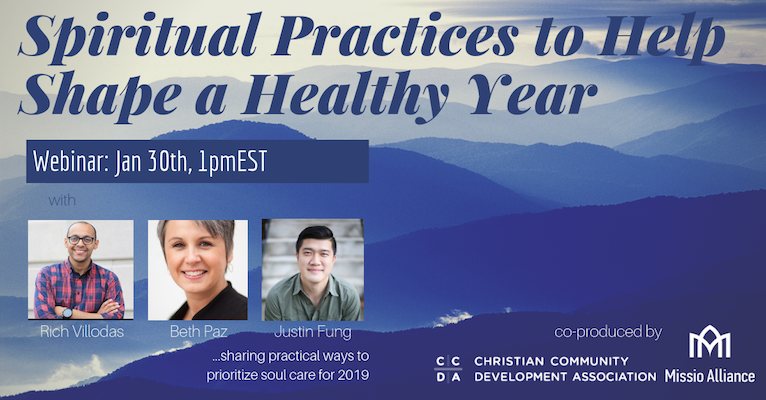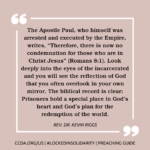
Wayne Forte
36 x 24 inches
Oil on canvas
When you step onto a plane and take your seat, you’re asked to listen to a simple set of safety precautions before takeoff. Flight attendants advise that you fasten your seat belt as the signs instruct, and in the case of an emergency, put on your oxygen mask before helping others.
As a Christian Community Development practitioner, you’re probably used to focusing on the needs and experiences of your community, family, or church – maybe even all three.
When was the last time you took a moment to secure your own mask?
What is soul care?
Soul care, is an individual’s process of personal health, especially as it pertains to the soul. Soul care will look different for every person, as everyone recharges their batteries in different ways.
When parents care for their children some of the needs they address are instinctual – they know when their children need a glass of water, or when they need another layer of clothes to keep warm.
Other needs are identified by asking – if a child is crying without a known cause, it’s up to the parent to evaluate the situation and the child to determine what circumstances caused them to cry.
Similarly, we tend to our own needs on an instinctual level. We don’t need to keel over with hunger to remember to eat throughout the day. Other needs, like the need for a breath of fresh air, the need to make a list of thoughts, the need to take a moment alone without distractions, these may require us to listen more closely to our bodies.
Why soul care matters

Wayne Forte
10 x 8 inches
Oil and acrylic on canvas
Whether you work within a church, non-profit, or on an individual scale, being present in vulnerable communities for the Glory of God can often be self-sacrificing. We are taught to humble ourselves, redistribute our privilege and wealth, and become a servant for the Lord.
This message of serving others usually doesn’t include a reminder to sit back with a cup of tea and listen to your favorite record. However, as we look closely at the way God loves each and every one of his children as individuals, we can start to see why soul care matters.
God wants each of us to live a wholistically rich and abundant life. We at CCDA often remind practitioners what this does not look like: the biggest house on the block, an overflowing bank account, a community that does not care to know about it’s neighbors.
Through God, we have the potential to be spiritually healthy; to love ourselves, to be at peace with ourselves, and to get ourselves back on track in difficult moments. Prioritizing soul care is important for a number of reasons.
- Soul care is accessible to anyone. Soul care doesn’t require a luxury spa or a meditation retreat. It’s not just for stay-at-home parents or people who can afford not to work. It can be as simple as taking five minutes on your lunch break to close your eyes and clear the mind.
If you feel like a moment alone is a luxury in itself, try practicing soul care techniques with your family. Start off family time with a moment of prayer, naming 3 things each person is thankful for, or a breathing exercise.
2. It allows you to recharge, spiritually. Knowing how your body recharges is a good way to get to know yourself. Are you the type of person that recharges by being in social settings, or alone?
No matter what makes you feel energized, this process can reinvigorate the time you spend with God.
Learn more about Soul Care with a CCDA Webinar by Rich Villodas, Justin Fung, and Beth Paz.
3. Just as you lift up others in your community, turn the praise back on yourself every so often. Take a moment to think about the compliments or affirmations you’ve received lately. You were wonderfully made by the Creator, just as you are.

Wayne Forte
60 x 60 inches
Oil and acrylic on canvas
Meditating on this can allow you to love yourself the way God loves you – see yourself the way God sees you.
4. Before we hope to see external changes in the way we act, it helps to focus on internal changes – the way we respond to stress, how we de-escalate anger, the time we take to be alone with God.
5. For many of us, we measure success with the health of our community. We feel called to see God’s love demonstrated through loving our neighbors and Christ embodied in our communities.
It’s important to remember that a healthy community starts with healthy individuals. Health goes beyond exercise, building healthy eating habits, or getting regular check ups. Mental health and soul care are part of the wholistic process of healthy living.
John Wesley was known to ask, “How is it with your soul?”
Simply asking yourself and others this question is a great place to start.

Spiritual Practices to Help Shape a Healthy Year is a webinar that will outline ways to take moments to work on the soul, no matter your lifestyle. Rich Villodas, Justin Fung and Beth Paz will share practices, rhythms and spiritual care plans to make sure your year is a healthy one.





